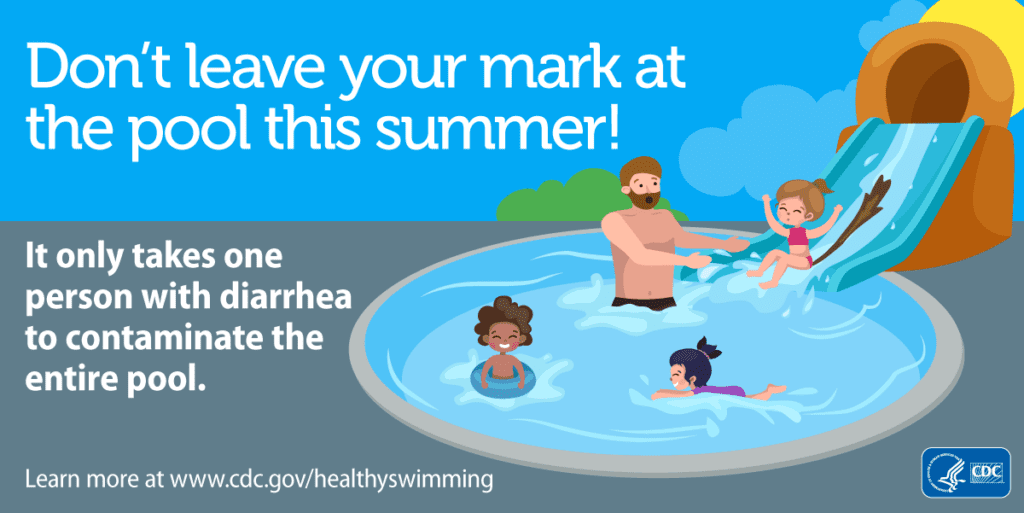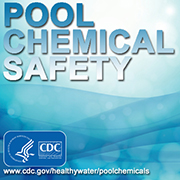
Contact our PIO directly to share health news.

770.339.4260
5 Important Reasons To Have A Healthy and Safe Swimming Week
Reason One: Illnesses caused by the germs we carry
CDC reports the microscopic parasite known as Cryptospoidum or “Crypto” has caused an increasing number of healthy adults and children to become incredibly sick in recent years. While chlorine can kill most germs within minutes, crypto can survive for more than 1 week at the recommended chlorine concentrations typically required by state and local health departments. Crypto comes from diarrheal incidents in the water we share. Which is why precautions should be taken when swimming in pools or playing in water parks.
Strokes to Take:
- Stay out of water if you have diarrhea
- Shower before and after using the pool
- Don’t pee or poop in the water
- Don’t swallow the water
- Every Hour-everyone out
- Take kids on bathroom breaks
- Check diapers and change them in a bathroom or diaper changing area — not pool side–to keep germs away from the pool
Reason Two: Drowning
Every day, two children less than 14 years old die from drowning. Drowning is a leading cause of injury death for children ages 1-4 years old. More than half of drowning victims treated in Emergency Departments need further hospitalization or care. In some cases, drowning can cause severe brain damage that could result in memory problems, learning disabilities, and permanent loss of basic functioning.
Strokes to Take:
- Make sure everyone knows how to swim
- Use life jackets appropriately
- Provide continuous, attentive supervision close to swimmers
- Know CPR
- Prevent access to water when pools are not in use
- Install and maintain barriers like 4-sided fencing and weight bearing pool covers
- Use locks/alarms for windows and doors
Reason 3: Injuries can be caused by mishandling pool chemicals (for pool operators and residential pool owners)
Pool chemicals are added to maintain water quality (for example, kill germs). Each year, however, mishandling of pool chemicals by operators of public pools and residential/backyard pool or hot tub/spa owners leads to 3,000-5,000 visits to emergency departments across the United States
Strokes to Take:
- Read and follow directions on product labels
- Wear appropriate safety equipment (goggles), as directed on product labels, when handling pool chemicals
- Secure pool chemicals to protect people, particularly young children, and animals
- Add pool chemicals poolside ONLY when directed by product label and no one is in the water
- NEVER mix different pool chemicals with each other, particularly chlorine and acid
- Pre-dissolve pool chemicals ONLY when directed by product label
- Add pool chemical to water, NEVER water to pool chemical
Reason 4: Harmful Algal Blooms
Algae can grow in warm, nutrient-rich fresh and marine waters. When there is an abundant growth of algae that harms people or animals, it’s referred to as harmful algal bloom (HAB). HABs in fresh and marine waters can produce toxins that cause skin irritation, coughing, sneezing, diarrhea, stomach pain, numbness, and dizziness. Symptoms vary depending on the type of HAB toxin and type of exposure — such as skin contact, ingestion by eating food or drinking water that’s contaminated with HAB toxins or even breathing in tiny droplets or mist contaminated with HAB toxins.
Strokes to Take:
- Look for waterbody or beach advisories announced by local public health authorities or beach managers. If the beach is closed, stay out
- Don’t swim, water ski, or boat in areas where the water is discolored or where you see foam, scum, or mats of algae on the water’s surface.
- Avoid entering or swimming in bodies of water that contain or are near dead fish or other dead animals
- Keep children or pets from playing in or drinking scummy water
- If you do swim in water that might contain HAB, get out and rinse off with fresh water ASAP
- If pets, especially dogs, swim in scummy water, rinse them off immediately. Do not let them lick the algae off of their fur
Reason 5: Naegleria Fowleri or “The Brain-eating Ameba”
Naegleria fowleri is a microscopic ameba that is commonly found in warm freshwater like lakes, rivers, and hot springs around the globe. If water containing the ameba goes up the nose forcefully, the ameba can invade and cause a rare infection of the brain called Primary Amebic Meningoencephalitis
Strokes to Take:
- The most certain way to prevent an infection is to not participate in fresh-water related activities
- If participating in fresh-water related activities
- Hold your nose or use nose clips
- Avoid putting head underwater in hot springs and other warm fresh water bodies
- Avoid water-related activities in all warm freshwater bodies during periods of high temperature
- Avoid digging in or stirring up mud and scum while taking part in water-related activities in shallow, warm freshwater
Helpful Links
- CDC Healthy Swimming
- Drowning Facts
- Chemical Safety Info for Pool Operators and Owners
- Harmful Algal Blooms
- Naegleria Fowleri “Brain-Eating Ameba”
- Healthy Swimming Mobile Apps
Information provided by Centers Of Disease Control and Prevention
Contact our PIO directly to share health news.






